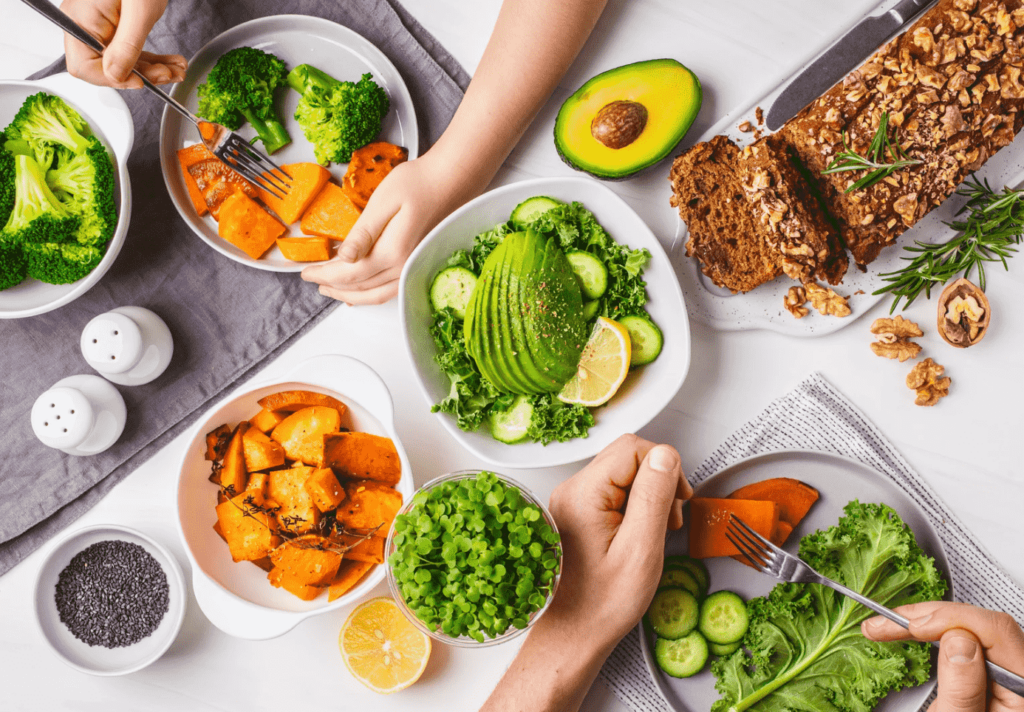La primera política alimentaria danesa basada en plantas del mundo puede enseñar a otros países cómo reducir el consumo de carne: primero estableciendo la demanda.

A Trine Krebs le encantan los productos agrícolas. “Cuando tengo en mis manos una planta que siento que está sana, puedo olerla, sentirla, casi saborearla en mi boca”, proclama esta agricultora de 47 años vestida con un cárdigan por Zoom.
Krebs ha sido apodada “Miss Legumbre Seca de Dinamarca” por su promoción de dietas ricas en plantas (o “plant-rig” en danés). Ha organizado festivales culinarios, enseñado a chefs y escrito canciones. En un programa de citas danés, Farmer Looking for Love, mostró a sus potenciales parejas cómo preparar legumbres. La primera la rechazó, la segunda se mostró tibia y la tercera quedó completamente enamorada. “Pensó que sabían increíble y quería que se las enseñara a todos sus amigos”.
A Krebs le encantan las legumbres, pero no todo el mundo en Dinamarca las ama. El país menos entusiasta a la hora de reducir el consumo de carne es Dinamarca, donde el 57% de la población dice que no quiere hacerlo. Esta vacilación contradice los datos que demuestran el efecto de la ganadería en el planeta: las dietas basadas en productos animales duplican las emisiones y amenazan los bosques y la biodiversidad. Además, violan las nuevas recomendaciones dietéticas de Dinamarca, que prescriben 350 g (0,77 lb) de carne a la semana. La mayoría de los daneses comen tres veces (los estadounidenses comen tres y media).
Esta vacilación puede tener orígenes profundos. “En nuestro cerebro todavía estamos en la sabana tratando de sobrevivir”, dice Krebs. Señala que las dietas occidentales, en particular en las regiones más frías de Europa, son ricas en carbohidratos simples, grasas y carne, y que la historia cultural reciente también puede contribuir. Dinamarca tiene grandes familias aristocráticas tradicionales con hermosos jardines llenos de las mejores frutas y verduras, como Gran Bretaña. Ella afirma que eso desapareció. Ahora, en lugar de “sexy”, las comidas vegetales se perciben típicamente como una necesidad aburrida añadida “por salud, no por placer”.
El gobierno danés planea hacer modificaciones. El gobierno de Mette Frederiksen anunció en octubre un plan nacional de alimentación basada en plantas, una primicia mundial. La declaración de 40 páginas describe el compromiso del país de normalizar las dietas ricas en plantas y fomentar la producción de proteínas vegetales y alternativas. Las directrices para toda la cadena alimentaria favorecen las hortalizas de raíz orgánicas, los sustitutos de los lácteos procesados y los hongos fermentados. No es necesario eliminar la carne y los productos lácteos, pero deberían tener un menor protagonismo.
El experto en nutrición de la Universidad de Harvard Walter Willet, que dirigió el estudio de la Comisión Eat-Lancet sobre la mejor dieta para un mundo sano, está “impresionado” por la medida y no conoce “ningún otro gobierno” que haya ejecutado una estrategia nacional. “No debería sorprendernos que Dinamarca haya tomado la iniciativa en este esfuerzo; se adelantó una década a otros países en la prohibición de las grasas trans y ha sido un líder mundial en el desarrollo de energía verde”, añade.
Únase a Future Earth
El boletín Future Earth de Carl Nasman ofrece noticias vitales sobre el clima y novedades positivas todos los martes. Los lectores que no residan en el Reino Unido pueden acceder a este correo electrónico. ¿Está en el Reino Unido? Suscríbase a los boletines aquí.
La producción de carne danesa es un tema candente. “Me interesará saber cómo abordaron este problema”, añade.
La preocupación de Willet es válida. Otras naciones europeas productoras de carne se han enfrentado a la resistencia a reducir o reemplazar los productos animales para combatir el cambio climático. Después de las protestas de los agricultores, Italia prohibió la carne de origen celular el mes pasado. En 2019, estallaron manifestaciones encabezadas por tractores en los Países Bajos contra la compra de una granja ganadera para reducir las emisiones de nitrógeno.
Dinamarca, el único país europeo con “más cerdos que habitantes”, depende de su negocio ganadero tanto como cualquier nación rica consumidora de carne. Sin embargo, sus prácticas de “manipulación de plantas” han evitado muchas críticas. Incluso los Demócratas de Dinamarca de derecha, que se oponen a un impuesto a las emisiones de la agricultura, apoyaron una subvención para el plan.
Algunos daneses creen que su ejemplo puede inspirar a otros países ricos. Entre otras cosas porque la Organización de las Naciones Unidas para la Alimentación y la Agricultura publicará una hoja de ruta alimentaria durante la cumbre climática COP28 de este año en Dubai, instando a las naciones occidentales a reducir el consumo de carne. Por primera vez, dos tercios de la cocina de la cumbre será vegana o vegetariana.
La transición a una alimentación basada en plantas en Dinamarca: ¿qué puede aprender el mundo?
Desde las ONG ambientalistas hasta los ejecutivos de empresas y los agricultores, la coordinación entre las partes enfrentadas puede ser la clave del éxito. Según el secretario general de la Sociedad Vegetariana de Dinamarca, Rune-Christoffer Dragsdahl, quien ayudó a redactar la estrategia: “El mundo tiene demasiado ganado. El cambio requiere una alternativa clara y emocionante, no simplemente una crítica”.
Dragsdahl afirma que la transición comenzó en las protestas inspiradas por Greta Thunberg antes de las elecciones de Dinamarca de 2019. Las manifestaciones masivas de ese año convirtieron el cambio climático en un tema político destacado en el Reino Unido, que adoptó un objetivo de reducción de emisiones 70%. Los sectores alimentario y agrícola, entre otros, tendrían que reformarse para lograr este objetivo. La Sociedad Vegetariana creó una red de proteínas vegetales para promover dietas y sistemas alimentarios basados en plantas.
Los seminarios y conferencias ayudaron a la red a desarrollar conexiones únicas. El primero fue un documento de visión elaborado por cinco ONG ecológicas y la nueva Asociación Danesa de Empresas de Productos Vegetales. El segundo fue elaborado por dos ONG ecológicas y el Consejo de Agricultura y Alimentación, que representa a muchos productores de ganado daneses, que desarrollaron una estrategia de investigación y desarrollo basada en plantas.
El tercero fue un nuevo “centro de conocimiento” creado por la Sociedad Vegetariana y Organic Denmark, que promueve el ganado. Buscaban puntos en común para formar una cooperación. “Nos concentramos en la necesidad de producir más productos de origen vegetal sin pesticidas”, dice.
Las colaboraciones mostraron a los legisladores que había espacio para el apoyo de todos los partidos. La ex ministra de Medio Ambiente y parlamentaria danesa Ida Auken aconseja a otros países que se unan a alianzas similares: “Hay que conseguir que los agricultores se sumen y los sindicatos se sumen, pero también hay que tener una visión clara: decir que este es el camino que vamos a seguir y hacerlo de forma gradual”.
También es importante destacar las posibilidades de creación de empleo, dice Auken. La crisis de Ucrania ha elevado los precios de producción, provocando pérdidas de empleo en los sectores lácteo y de mataderos en Dinamarca. Auken cree que el sector emergente de productos de origen vegetal puede transformar las cosas. "Si obtenemos 2% de ese mercado de productos de origen vegetal, podría significar entre 20.000 y 40.000 puestos de trabajo, lo que es mucho en Dinamarca".
También es fundamental que se colabore para planificar la ejecución. Una subvención para alimentos de origen vegetal contribuye a ello. Esta inversión de 1.250 millones de coronas (155 millones de libras esterlinas) promoverá la fabricación de productos de origen vegetal, y la mitad de esa suma se destinará a empresas de alimentos orgánicos.
La primera ronda de financiación de la subvención, anunciada esta semana, prioriza la formación profesional en cocina y servicio de alimentos en Dinamarca. Se financió la idea de Krebs de crear un "equipo de viajes veganos" para formar a cocineros de todo el país. También se apoyó un "banco de conocimientos" consolidado para cocineros y un nuevo título en vegetarianismo para la escuela de hostelería de Dinamarca.
También se han financiado nuevos procesos de fermentación y la fabricación de quesos y yogures de origen vegetal para mejorar la oferta. Si la demanda de los clientes es baja, los productos y la cocina de origen vegetal tienen un límite. La segunda mayor inversión se destinó a programas de motivación de la gente y apoyo a los comercios. La Semana Nacional de las Verduras, un “Foodjam” durante el Festival de Roskilde de Dinamarca de 2024 y una iniciativa de la cadena de supermercados “Make it Easy” forman parte de este tramo.
Fuera del país, el Consejo Danés de Agricultura y Alimentación, la embajada danesa en Londres y la Asociación de Suelos del Reino Unido trabajarán para ampliar las exportaciones danesas a Gran Bretaña.
Al poner el énfasis en la estimulación de la demanda en lugar de las medidas punitivas, los legisladores daneses esperan que su industria agrícola perciba los alimentos de origen vegetal como una oportunidad para generar nuevas habilidades y empleo, no como un peligro para sus medios de vida. “Una solución climática crucial. El cambio alimentario es tan enorme como los parques eólicos”, añade Auken. “No queremos una confrontación con los agricultores como en los Países Bajos o con los veganos y los carnívoros. Queremos una cultura culinaria más intrigante”.
¿Qué pueden aprender otros países?
Otros países están tomando nota. La Asociación Vegetariana Portuguesa (AVP) propone un Plan Nacional de Proteínas de Origen Vegetal. Joana Olivereira, de la AVP, dijo que un fondo para la producción de legumbres al estilo de Dinamarca fue rechazado por el parlamento a principios de este año, aunque los partidos de izquierda y derecha lo apoyaron.
El presupuesto alemán para 2024 incluye 38 millones de euros (32 millones de libras esterlinas) para proteínas de origen vegetal, fermentadas con precisión y cultivadas con células, y para la transformación agrícola. ProVeg International, la organización vegetariana más grande del mundo, calificó la medida como un "cambio de paradigma", pero señaló que la suma única no alcanza el mayor compromiso financiero de Dinamarca y su plan más "exhaustivo".
"Esperamos que la hoja de ruta de la FAO para alcanzar los 1,5 °C establezca recomendaciones para que las naciones con un alto consumo limiten su ingesta de carne y, dado que ya tiene un papel destacado en la Beyond Oil and Gas Alliance, quizás no sea una sorpresa que Dinamarca vuelva a dar el ejemplo", dice Helen Harwatt, miembro del grupo de expertos.
La competitividad del comercio mundial está impulsando la transición hacia una alimentación basada en plantas. Corea del Sur lanzará en diciembre una estrategia de promoción del sector de alimentos basados en plantas, a la que califica de “nuevo motor de crecimiento”.
No a todo el mundo le gustará un plan nacional al estilo danés. Según Ciniro Costa Jr., científico de la Alianza para la Biodiversidad Internacional y del CIAT, muchos países de ingresos bajos y medios, como Brasil, dependen de productos animales y no pueden adaptarse rápidamente. Sus medidas alternativas para reducir las emisiones incluyen la mejora de los pastos y el establecimiento de pastoreo rotativo.
Dinamarca tiene mucho que aprender de otras naciones, especialmente en lo que respecta a la cocina basada en plantas.
“En la India, ya existe una dependencia sustancial de las dietas basadas en plantas, influenciada por factores culturales, religiosos y económicos”, dice el director ejecutivo de la Asociación de la Industria de Alimentos Basados en Plantas, Sanjay Sethi, y agrega que la demanda de carne está aumentando.
La dieta rica en carne de Dinamarca hace que el cambio de hábitos sea uno de sus mayores problemas. Los cocineros recién formados ayudarán a los daneses a desarrollar una versión de esa dieta basada en plantas.


